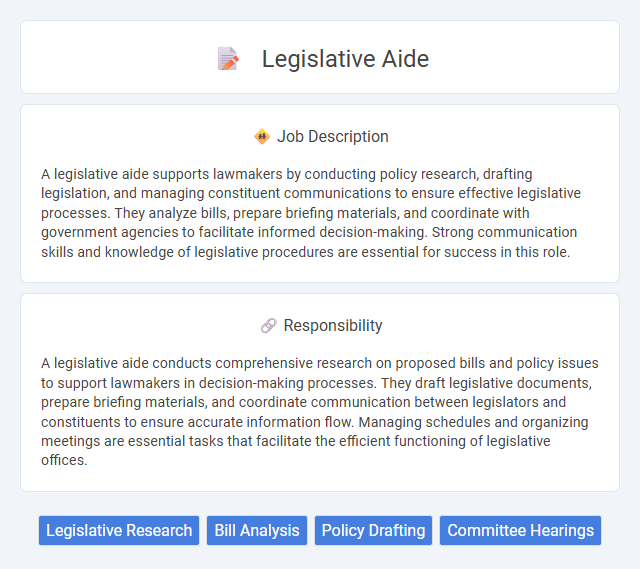
A legislative aide supports lawmakers by conducting policy research, drafting legislation, and managing constituent communications to ensure effective legislative processes. They analyze bills, prepare briefing materials, and coordinate with government agencies to facilitate informed decision-making. Strong communication skills and knowledge of legislative procedures are essential for success in this role.
Individuals with strong communication and organizational skills are likely to thrive as legislative aides due to the role's demands for precise information management and effective stakeholder interaction. Those who prefer structured environments and have an interest in policy development may find the job particularly suitable. However, individuals who struggle with multitasking or high-pressure settings might face challenges adjusting to the fast-paced legislative environment.
Qualification
A Legislative Aide must possess strong research and analytical skills to effectively support policymakers in drafting bills and preparing briefing materials. Proficiency in understanding complex legislative procedures and excellent communication abilities are essential for liaising between government officials and constituents. A bachelor's degree in political science, public administration, or a related field, combined with experience in legislative environments, significantly enhances qualification for this role.
Responsibility
A legislative aide conducts comprehensive research on proposed bills and policy issues to support lawmakers in decision-making processes. They draft legislative documents, prepare briefing materials, and coordinate communication between legislators and constituents to ensure accurate information flow. Managing schedules and organizing meetings are essential tasks that facilitate the efficient functioning of legislative offices.
Benefit
Legislative aide positions likely offer valuable opportunities for professional growth through close collaboration with lawmakers and insight into the legislative process. Benefits may include gaining expertise in policy research, networking within political circles, and developing skills in communication and advocacy. The role probably provides a unique platform to influence public policy while enhancing career prospects in government or related fields.
Challenge
Working as a legislative aide likely presents significant challenges, including managing complex policy research and navigating the fast-paced political environment. The role probably demands strong problem-solving skills to address unexpected issues and effectively support lawmakers. High-pressure situations may frequently arise, requiring adaptability and precise communication to influence legislative outcomes.
Career Advancement
Legislative aides play a crucial role in the political arena by conducting research, drafting bills, and advising legislators on policy decisions, which builds a strong foundation for career growth in government or public affairs. Gaining expertise in legislative processes, networking with influential policymakers, and developing specialized knowledge in areas such as healthcare, education, or finance significantly enhance promotion prospects to senior legislative roles or policy advisory positions. Continuous professional development through internships, advanced degrees in political science or public administration, and active participation in legislative committees also accelerate advancement opportunities within legislative offices or related sectors.
Key Terms
Legislative Research
Legislative aides specializing in legislative research analyze bills, policies, and legal documents to provide critical insights for lawmakers. They gather and synthesize data on legislative trends, draft reports, and prepare briefing materials that guide decision-making processes. Expertise in legal databases and policy analysis tools is essential to deliver accurate, timely, and comprehensive legislative support.
Bill Analysis
Legislative aides specializing in bill analysis meticulously review and interpret proposed legislation to assess its potential impact and feasibility. They prepare detailed reports summarizing key provisions, amendments, and legal implications, supporting lawmakers in informed decision-making. Expertise in legal research methods and policy evaluation is essential for accurately advising on legislative strategy and stakeholder perspectives.
Policy Drafting
Legislative aides specializing in policy drafting play a critical role in shaping effective laws by conducting comprehensive research and analyzing legislative proposals. They collaborate closely with lawmakers to translate complex policy ideas into clear, precise legal language that meets regulatory standards. Mastery of statutory interpretation and subject matter expertise enables these aides to anticipate legislative impacts and ensure policy coherence throughout the drafting process.
Committee Hearings
Legislative aides play a crucial role in organizing and preparing materials for committee hearings, ensuring that legislators have all pertinent information to make informed decisions. They coordinate witness testimonies, compile briefing documents, and track the progress of bills under review. Their expertise in legislative procedures enhances the efficiency and effectiveness of committee discussions and policy development.
 kuljobs.com
kuljobs.com